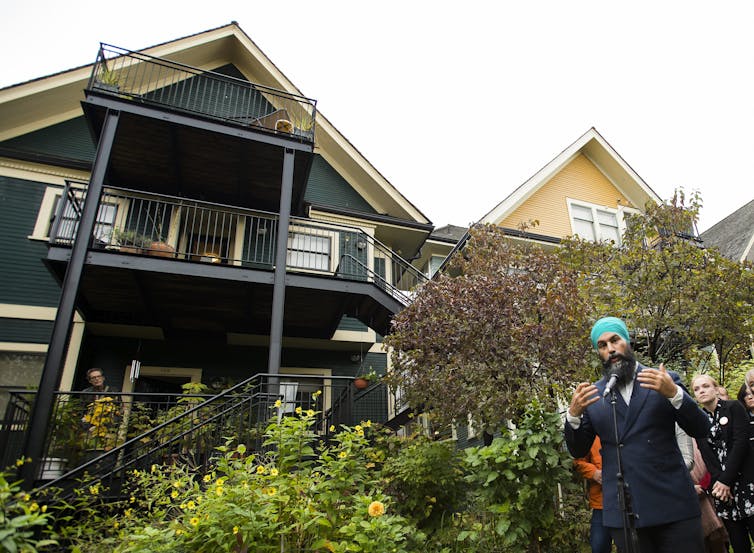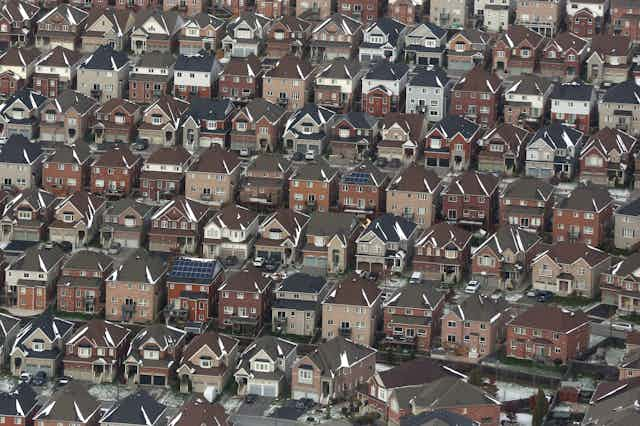Along with climate change, affordable housing was one of the big issues of the recent Canadian federal election, with political parties scrambling to catch up with public opinion.
The widespread concern among the electorate should not have come as a surprise to politicians. Only in three per cent of neighbourhoods across Canada can a full-time minimum wage earner afford a two-bedroom apartment.
In many of the ridings with the tightest races in Toronto and Vancouver, more than a quarter of renters are paying over 50 per cent of their household income on rent plus utilities.
Banks have calculated rental housing deficits in the tens of thousands in Canada’s largest cities, which are causing disastrously low vacancy rates.
This broad-based consensus on the need for more affordable housing led to Canada’s first national election housing debate, organized two weeks before the election by a coalition of unusual suspects from across the political spectrum: The Canadian Alliance to End Homelessness, the Canadian Housing and Renewal Association (the industry body for non-profit social housing) and the Cooperative Housing Federation of Canada joined up the with Canadian Real Estate Association and the Canadian Home Builders Association.
Nonetheless, affordable housing was not substantially addressed during the three federal leaders’ debates, a sign that parties may be ignoring the youth vote at their future peril.
‘Stay the course’
At the housing debate, a broad gulf was exposed not only between the two major parties, the Liberals and Conservatives, but also among Liberals and the three parties the newly elected minority government will need to have onside in the coming months and years.
The main message of the Liberal Party housing platform is “stay the course.” Justin Trudeau’s first term saw the return of the federal government to a national housing strategy after three decades of policy neglect and declining funds.
Just before the election call, Canada officially made housing a federally legislated right. This enables Canada to honour its international obligations under United Nations conventions. But how this legal change will play out in a global context of increasing commodification of housing, and the importance of adequate housing to global sustainability goals, is still unclear.
Much of the $55 billion that the Liberal government has committed to social and affordable housing will not be spent until at least one election from now, and is also reliant on federal-provincial/territorial agreements that, in the significant case of Québec, are not yet signed.
Doesn’t help the most vulnerable
Third-party budget analysis also suggests that the National Housing Strategy does not substantially increase support for the individuals and families most vulnerable to homelessness.
The Conservatives took a radically different perspective when it came to housing policy, promising to further loosen restrictions on mortgages in proposals that seemed similar to the sub-prime lending practices that precipitated the global financial crisis of 2007.
In contrast, the platforms of the the NDP and the Greens promised to substantially increase non-profit housing production five-fold from the Liberal commitment of 100,000 new and renovated dwellings over the next 10 years.

That’s nowhere near close to the recommendation made in 1972 by Michael Dennis and Susan Fish, Progressive Conservative housing policy analysts, to the Canada Mortgage and Housing Corporation that 45 per cent of all new housing production be non-profit. But the NDP and Green proposals would have still allow scaling up social housing to about 10 per cent of production, a proportion achieved between 1965 and 1990.
This scale of non-profit housing production would help eradicate homelessness (as opposed to merely halving the rate, which is the current federal 10-year aim), and would spur the substantial retrofitting of homes for energy efficiency, a vital mechanism if Canada is to achieve carbon reduction targets.
Québec has it right
The Bloc Québécois housing platform, which also recommends increased federal spending on social housing, brings up the legitimate point that unlike most other provinces and territories, Québec has had a strong affordable housing policy over the last three decades of neglect.
Read more: How the Liberals paved the way for the Bloc's return
Its distinct — and successful — approach should be respected as part of any federal-provincial agreement.
Canadian cities that have been left to shoulder the burden of affordable housing and homelessness also want a seat at the policy table in relation to issues like developing community land trusts and implementing inclusionary zoning
A gender-based intersectional analysis has been emerging, pointing out that women-led households are three times more likely to be living in housing stress, that racism in landlord-tenant relations is endemic and that Indigenous and new migrant families are more likely to need larger units than those currently being developed at the low end of the market.
Building bridges
A Liberal minority government might increase the economic stimulus package embedded in investment in social and affordable housing, and in that way build bridges with the NDP, Green and BQ MPs.
Doing so, in addition to clamping down on out-of-control housing speculation, would respond to the concerns of urban voters who helped get this government get elected in Toronto, Montréal and other large cities.
The left-of-centre parties, in turn, could make hay from the fact that a minority government was forced yet again to bring in progressive policies due to their influence.
Unlike divesting in the Trans Mountain pipeline, investment in affordable housing would not further enrage Alberta and Saskatchewan. And it would further create distance from a Conservative approach to housing, which would only help in terms of the next election.
There are many winners in a scenario where a minority government enacts stronger supports for non-profit housing. The biggest are those who would get secure and affordable homes.
[ You’re smart and curious about the world. So are The Conversation’s authors and editors. You can read us daily by subscribing to our newsletter. ]

